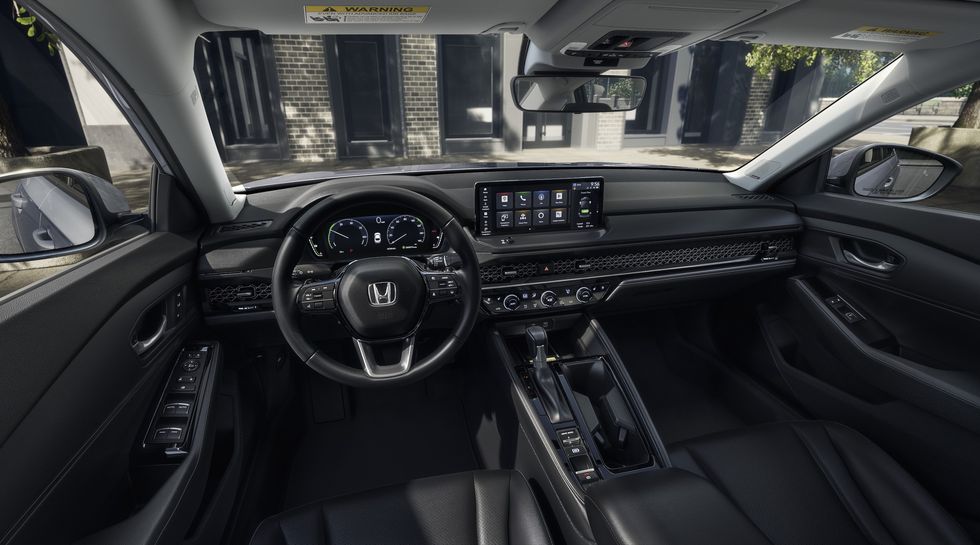Enough exposure to anything can kill the magic. Everyone wants to drive new luxury cars, but drive enough and the appeal wears thin. Each has more obnoxious gizmos than a reasonable person would need, a more complicated interface than anyone over 12 can operate intuitively, and a cabin that is well on its way to becoming all screens. I no longer want an impressive, or futuristic, or advanced luxury car. I want a nice one. And it’s Honda, of all companies, that delivers.
The Honda Accord has always been nicer than it had to be. While the vast majority of midsize sedan sales go to nameplates that show no interest in sophisticated dynamics, Honda has always paid attention to the experience of driving its family sedan. The chassis balance, handling, engine, and controls have always been closer rivals to premium German sedans than any generation of Camry. That focus on lightness, engagement, and simplicity meant that while these Accords were nice to drive, they certainly weren’t luxury vehicles.
The newest Accord changes that.
It is the driver’s choice in the segment, especially now that the less refined, comfortable, spacious, and efficient Mazda6 has left dealers. But years of inching toward the premium market have paid off. The new Accord not only feels like a front-wheel-drive BMW 3 Series, it rides like one, too, and offers a cabin that I’d happily pay $40,000 for. Its infotainment is smooth, predictable, and simple, with sophisticated graphics and built-in Google Maps. The powertrain is quieter and wind noise is less prevalent, even if Honda hasn’t fully overcome its issues with road noise.
But real luxury is not a list of features or attributes. It is a cohesive, relaxing experience. It’s something that so many automakers lose track of in the pursuit of stats that look good in a magazine. It’s not a barely functioning digital assistant or a useless gimmick like BMW’s gesture control, not a 0-60 time that’ll make your eyes blur. It’s sitting in a car and knowing that everything you do in it will feel pleasant. Rolls-Royce understands this. So does Genesis. But you don’t have to aim that high. Because if you want a relaxing experience in a car, an Accord Touring is all you need.
Its controls are simple, and precise. A decade of Honda fumbling the bag on infotainment has come to the end, the new Accord’s system as polished and quick as any luxury car’s. Pleasant materials and world-beating quality add to the appeal. The cabin design is straightforward, attractive. Everything is simple and elegant without being basic, or cheap. There are high-quality knobs and buttons for key climate and infotainment functions, so you’re never frustrated on the move. Everything feels thought-out.
That’s doubly true on the road. The Accord feels more sophisticated than any mainstream sedan I’ve driven, and better sorted than plenty of luxury cars. The ride is on the firm side of graceful, but without the harsh rebound or bucking a modern German sports sedan and its stiff chassis provide. The new Accord is closer to an early-Aughts BMWs. The body moves in corners and over bumps, softening the harshest edges without ever feeling sloppy or floaty. Push it hard, and you find a relaxed, competent canyon carver, always predictable and extraordinarily friendly.
The powertrain is admittedly less suited to this sort of behavior, as the hybrid system takes a moment to wrap your head around. It makes 204 hp and 247 lb-ft of torque, but delivers it without a transmission. Instead, it’s got a two-motor coupling between the engine and the wheels, with one electric motor functioning as an engine-spun generator and the other providing twist to the wheels. The result is something that feels like a continuously variable transmission, with the revs rising, falling, and holding in ways that aren’t intuitive. Synthetic sounds try to amp up the excitement factor, and the Accord pulls hard at any double-digit speed, but this is an efficiency-oriented powertrain that happens to hold up well under abuse.
It’s well-suited to the Accord, which is a practical machine first and a fun toy in occasional bursts. The same is true for the brakes. The pedal blends friction and regenerative braking so masterfully that you forget you’re driving a hybrid. Purely internal-combustion Toyotas, Hyundais, and Kias don’t have pedals this linear. Drive hard for a few minutes and you’ll smell them, though, as the Accord isn’t built for sustained romping.
It doesn’t have to be. As it sits, it’s the perfect daily. The Accord Sport and Touring Hybrid get 46 mpg in the city and 41 mpg on the highway, per the EPA, and my experience suggested that those numbers are realistic. It also comfortably fits four adults, swallows plenty of cargo, rides better than most BMWs, drives as well as any of the Germans, and feels nicer inside than any other sub-$40,000 car.
If you get the Sport Hybrid—which has most of the stuff you actually need—it’ll only cost you $32,440. If history is any guide, that Accord will also last forever and rarely require more than oil and gas. That may not sound as exciting as the latest 700-hp Mercedes, but a pleasant experience that endures is what I want from a luxury car. When everyone else seems to have given up on that, it’s good to see that Honda hasn’t.
Arguably the most fickle member of the Road & Track staff, Reviews Editor Mack Hogan is likely the only person to ever cross shop an ND Miata with an Isuzu Vehicross. He founded the automotive reviews section of CNBC during his sophomore year of college and has been writing about cars ever since.
















